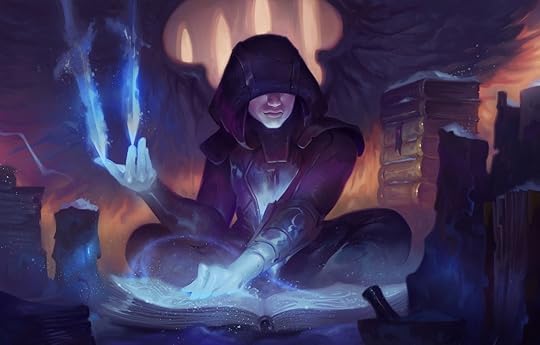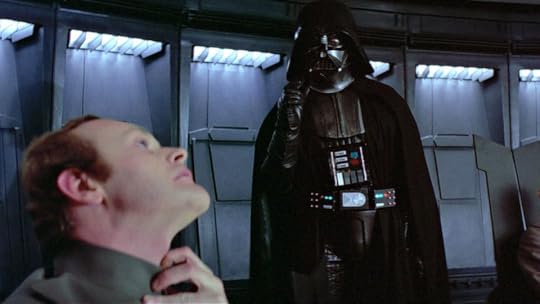Rule Number Four of Magic: Drop the Special Effects!
We've more or less got the principles of magic and fantasy down now, their role in the setting and the narrative, but it's still important to consider aesthetics as well. And I've always found that a lot of the magic, especially in the modern day, might really want to consider that "Less is More".
I mean, nine times out of ten, when I search artwork about wizards casting spells, I get shit like this:




I get that this is a visual medium, and that oftentimes it's difficult to get across what is happening, especially in still images. You'll think that having no effects at all would make it too ambiguous what's going on, or the whole thing would seem boring, or all the power and majesty of sorcery might not come across.
I wholeheartedly disagree. I think that turning wizards into walking fireworks dispensers is what kills the magic quickly, not the opposite. The actual power of magic, the subtlety of true and terrifying witchcraft, drowns under the lightshow.
Witness an example of the opposite - the very first use of Force in cinema history:

Vader doesn't give a single fuck here. You can see exactly what's going on, what he's doing, and just what the implications of this thing are. Your faith will not be lacking afterwards.
And yet even this was ruined later on. For some reason I can't begin to comprehend, virtually every time someone's force-choked in comics or video games, the victim also levitates off the ground a bit. Sometimes the choke itself gets special effects, like here.

Why? What purpose does any of this carry? What does it add to the scene, or to the story? How does it make the magic (or Force, in this case) seem any scarier or more imposing than it used to be? Or is it about the whole thing being unclear - was Vader being too ambiguous earlier?
And yes, this sort of magic-use has crept along into literature as well - I probably wouldn't be talking about it here otherwise. Flashy lightshow wizards abound in books, even though they're not a visual medium at all and you'd think they could come up with better ways to describe it all. Alas.
I continue to not getting it, so up until someone clearly and concisely explains to me why virtually everyone is doing this shit, changing my mind in the most enlightening and dramatic way, my wizards will continue to be subtle. All magic use will come with the bare minimum of special effects: fireballs will burn, a blinding flash will of course be bright as hell, but there will be no blue lights or whatever surrounding the wizard as he casts.
He's not here to be flashy. He's here to get shit done with magic.

And that's the rules of magic more or less down, as I see them, barring if I come up with something else later that I forgot or neglected to address so far. It doesn't feel like there'd be much else left to discuss, though. But I've been wrong before.
Next time I'll talk about all this in practice: I've been writing a highly magical story lately, and I think it'll make for some good examples here.
I mean, nine times out of ten, when I search artwork about wizards casting spells, I get shit like this:




I get that this is a visual medium, and that oftentimes it's difficult to get across what is happening, especially in still images. You'll think that having no effects at all would make it too ambiguous what's going on, or the whole thing would seem boring, or all the power and majesty of sorcery might not come across.
I wholeheartedly disagree. I think that turning wizards into walking fireworks dispensers is what kills the magic quickly, not the opposite. The actual power of magic, the subtlety of true and terrifying witchcraft, drowns under the lightshow.
Witness an example of the opposite - the very first use of Force in cinema history:

Vader doesn't give a single fuck here. You can see exactly what's going on, what he's doing, and just what the implications of this thing are. Your faith will not be lacking afterwards.
And yet even this was ruined later on. For some reason I can't begin to comprehend, virtually every time someone's force-choked in comics or video games, the victim also levitates off the ground a bit. Sometimes the choke itself gets special effects, like here.

Why? What purpose does any of this carry? What does it add to the scene, or to the story? How does it make the magic (or Force, in this case) seem any scarier or more imposing than it used to be? Or is it about the whole thing being unclear - was Vader being too ambiguous earlier?
And yes, this sort of magic-use has crept along into literature as well - I probably wouldn't be talking about it here otherwise. Flashy lightshow wizards abound in books, even though they're not a visual medium at all and you'd think they could come up with better ways to describe it all. Alas.
I continue to not getting it, so up until someone clearly and concisely explains to me why virtually everyone is doing this shit, changing my mind in the most enlightening and dramatic way, my wizards will continue to be subtle. All magic use will come with the bare minimum of special effects: fireballs will burn, a blinding flash will of course be bright as hell, but there will be no blue lights or whatever surrounding the wizard as he casts.
He's not here to be flashy. He's here to get shit done with magic.

And that's the rules of magic more or less down, as I see them, barring if I come up with something else later that I forgot or neglected to address so far. It doesn't feel like there'd be much else left to discuss, though. But I've been wrong before.
Next time I'll talk about all this in practice: I've been writing a highly magical story lately, and I think it'll make for some good examples here.
Published on June 28, 2019 11:44
•
Tags:
disappearing-underpants, force-choke, magic, magic-systems, special-effects, subtlety, wizards
No comments have been added yet.
Pankarp
Pages fallen out of Straggler's journal, and others.
Pages fallen out of Straggler's journal, and others.
...more
- Juho Pohjalainen's profile
- 352 followers



